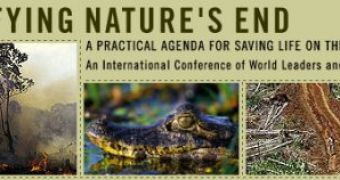An unprecedented international symposium called "Defying Nature's End: The African Context," will examine how conserving the continent's unmatched biodiversity can help alleviate poverty, fight disease and improve the quality of life for people. The symposium from June 20-24 in Madagascar's capital will be attended by government leaders, international organizations, conservation groups and local communities. Speakers will include Madagascar President Marc Ravalomanana; Jeffrey D. Sachs, director of the U.N. Millennium Project and special advisor to U.N. Secretary-General Kofi Annan; and environmental leaders from around the world, particularly Africa.
Major themes for the symposium organized by Conservation International include the status and importance of African biodiversity; assessing and valuing the ecosystem services it provides; using debt relief to properly manage natural capital and reduce poverty; and how biodiversity conservation can help Africa reach the Millennium Development Goals set by the United Nations in 2000 to achieve significant progress in alleviating poverty worldwide by 2015.
In addition, the symposium will present the latest research on links between the environment, poverty and health, and new strategies on resource management and governance to realize the greatest benefits from nature.
"No one can argue that nature provides the cheapest and most effective source of clean water, food, natural resources and other benefits of ecosystem services," said CI President Russell A. Mittermeier. "The challenge is how to maximize these benefits in a sustainable way through biodiversity conservation, so that they exist in perpetuity. That is exactly what the Madagascar symposium will be tackling."
"This Symposium is rightly emphasizing the positive, mutually reinforcing relationships between the conservation of biological resources, poverty alleviation and economic growth," said Kofi Annan. "In Africa and elsewhere, let us all put an end to the exploitation of natural resources for one-time payoffs, and instead develop strategies for using them sustainably, in ways that will benefit all people."
The symposium will include five plenary sessions that will be synthesized at the end to produce the Madagascar Declaration, a virtual blueprint for how African biodiversity can contribute to sustainable development and alleviate poverty and disease transmission. Plenary topics include:
"Africa's Importance for Biodiversity - Opportunities and Constraints," featuring presentations by CI President Russell A. Mittermeier and other major environmentalists;
"How debt reduction and investment should ensure that nature's capital is well-managed and poverty is reduced," featuring presentations by the World Bank, Agence Fran?aise pour le D?veloppement, and IUCN-World Conservation Union;
"Environment, Poverty and Health," featuring presentations by Prof. Bob Swanepoel of South Africa's National Institute for Communicable Diseases, and Okyeame Ampadu-Agyei, head of CI's Ghana program;
"Putting Africa's Biodiversity to Work; Environmental Services Valued and Evaluated," featuring presentations by David Obura from Coral Reef Degradation in the Indian Ocean, and Carlos Manuel Rodriguez, former environment minister of Costa Rica;
"Resource Management and Governance," featuring presentations by Joelisoa Ratsirarson, Secretary-General of Madagascar's Ministry of Environment, Water and Forests, and John Woods, managing director of Liberia's Forestry Development Authority.
Madagascar, renowned for its lemurs and other wildlife found nowhere else, in recent years has reversed a legacy of deforestation by protecting its unique biodiversity. In 2003, President Ravalomanana committed to tripling his island-nation's total protected areas to 6 million hectares (14.82 million acres or 23,000 square miles) by 2008. As part of that program, the government in December expanded Madagascar's protected territory by a combined area larger than Cyprus.
Madagascar's program is a model for developing world governments faced with the choice of exploiting natural resources for a one-time payoff or conserving natural assets so the economy and local communities benefit from them forever. Other nations opting for conservation and long-term benefits include Costa Rica and Equatorial Guinea.

 14 DAY TRIAL //
14 DAY TRIAL //